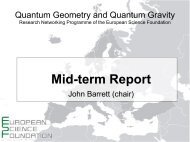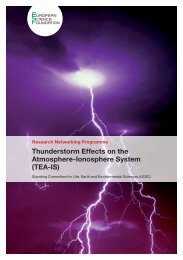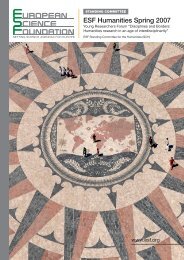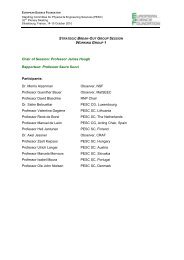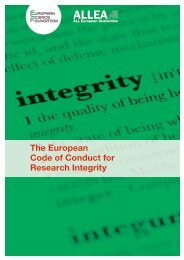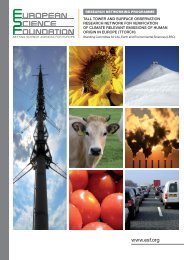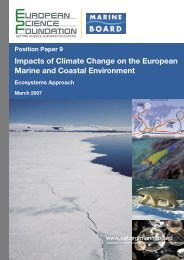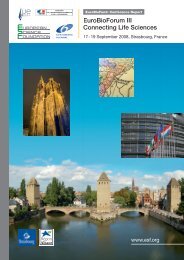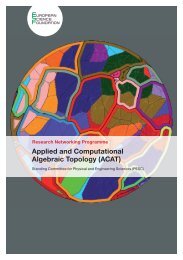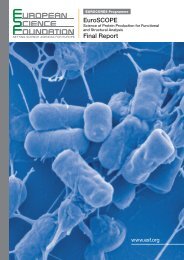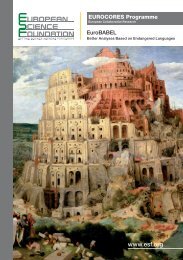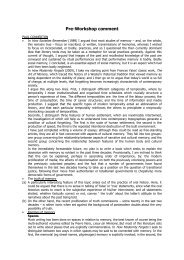European Peer Review Guide - European Science Foundation
European Peer Review Guide - European Science Foundation
European Peer Review Guide - European Science Foundation
Create successful ePaper yourself
Turn your PDF publications into a flip-book with our unique Google optimized e-Paper software.
56<br />
<strong>European</strong> <strong>Peer</strong> <strong>Review</strong> <strong>Guide</strong><br />
• The originality of the Ph.D. project;<br />
• The feasibility (access to the resources, etc.) and<br />
the impact of its potential outcomes;<br />
• Applicant’s academic performance.<br />
2. Postdoctoral Fellowships and Grants<br />
• Scientific/technological quality and potential of<br />
the project;<br />
• Training quality (relevance, capacity, complementary<br />
skills, etc.);<br />
• Applicant (experience, publications, suitability to<br />
perform the project, etc.);<br />
• Feasibility and implementation (access to infrastructure,<br />
management, practical arrangements);<br />
• Impact (on career development).<br />
3. Grants for the creation of Independent<br />
Research Groups<br />
• Focus on person;<br />
• Evidence of excellence (awards, achievements,<br />
publication record).<br />
4. Advanced career grants<br />
• Outstanding track record of research;<br />
• Proven scholarly and scientific contributions;<br />
• Scientific/research independence;<br />
• Creativity and originality of proposed<br />
approaches;<br />
• Unconventional methodologies and investigations.<br />
5.4 Final selection and funding<br />
decisions<br />
The final decision is normally taken by a committee<br />
or board within or on behalf of the organisation in<br />
charge of the programme. Usually the final decision<br />
is taken on the basis of a priority list proposed by<br />
a review panel and made on the basis of the external<br />
peer review recommendations (remote reviews),<br />
comments and arguments of applicants, and discussion<br />
during a panel session.<br />
According to the ESF Survey Analysis Report on<br />
<strong>Peer</strong> <strong>Review</strong> Practices, in 40% of the responding<br />
organisations the final decision is taken by a Standing<br />
Scientific Committee composed of well-established<br />
researchers who in turn make their decision based<br />
on remote peer review recommendations. In 24% of<br />
the organisations the final funding decision is taken<br />
by the organisation’s executive management that<br />
also decides on the basis of the external peer review<br />
recommendations 67 .<br />
67. See <strong>European</strong> <strong>Science</strong> <strong>Foundation</strong> (2010b), ESF Survey<br />
Analysis Report on <strong>Peer</strong> <strong>Review</strong> Practices, in particular Question 91,<br />
Figure 4.1.



